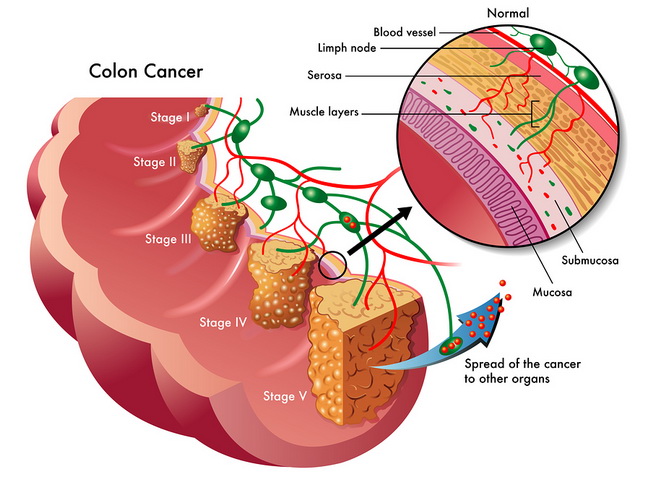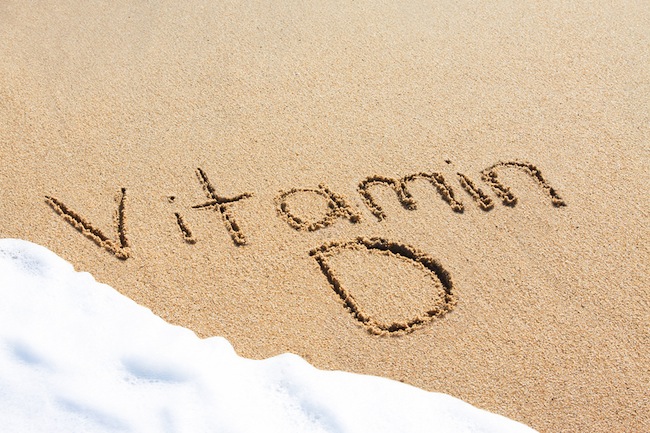- Make It Yourself Lavender Heart-Shaped Bath Bombs!
- 20 Things You Never Knew About “Down There”
- 12 Best Foods For Those Suffering From Arthritis Pain
- 12 Personal Hygiene Mistakes Almost Everyone Makes (Mom Never Told You About #4!)
- 15 Medicinal Plants And Herbs From The Cherokee People
- 12 Mind-Blowing Benefits Of Drinking Coconut Water During Pregnancy
- 12 Outstanding Winter Foods That Won’t Fatten You Up Like A Christmas Turkey
12 Easy Ways To Reduce Your Risk Of Colon Cancer (#4 Feels So Good!)

Photo credit: bigstock.com
Colon cancer, sometimes called bowel cancer, colorectal cancer, or rectal cancer, is the third most common type of cancer in the US. This type of cancer affect the large intestine (frequently called the colon), which is the very lowest part of your digestive system. With more than 140,000 people each year being diagnosed with colon cancer each year and more than one in twenty Americans developing this type of cancer during their lifetime, this type of cancer seems to be striking more and more people each year.
Many cases begin as small, non-cancerous spots called polyps. Over time, these lumps of cells often turn cancerous. Polyps show almost no symptoms, which unfortunately means that this type of cancer often goes unnoticed until it has reached later, more advanced stages.
Common symptoms of colon cancer are rectal bleeding, blood in the stools, abdominal pain or discomfort that does not go away, a feeling of being bloated, even after a small meal, unexplained weight loss, weakness or fatigue, and a feeling that their system is not “clean.”
Although the exact cause behind colon cancer is not yet known, there are certain factors that are well-known for increasing a person’s risk of developing this type of cancer. Some of these risk factors are family history, diabetes, inflammation in the intestines, aging, and radiation therapy. African Americans are more likely to develop colon cancer.
Although some of these risk factors, such as aging, are out of your control, others are completely within your control. By making simply changes to your diet and lifestyle, you can protect yourself and your family from this deadly type of cancer.
Keep reading so that you can do everything in your power to limit your risk of colon cancer.
1. Stop Smoking
If you are a smoker, then you already know the risks involved as far as lung cancer goes, but are you aware that you also are increasing your risk of developing colorectal cancer? You are also increasing your risk of developing stomach cancer and esophageal cancer as well. If you have tried to quit in the past but failed, don’t give up! Many people try six or seven times before they finally make the break. If you are still smoking, for your health’s sake, quit today.
2. Get Regular Exercise
One of the root causes behind colon cancer is a sedentary lifestyle. The Journal of the National Cancer Institute published a study in 2014 finding that a sedentary lifestyle was strongly linked to an increased risk of many different types of cancer, including lung cancer, endometrial cancer, and colon cancer, as well as heart disease, obesity, and diabetes. That is a whole lot of cancer and disease you are risking for that Twilight marathon on television. Getting moderate, regular exercise is one of the most important things you can do for your overall health. Even if you have been inactive for quite some time, you can get back into the exercise habit by starting slowly. Those baby steps add up quickly! Start with just five or 10 minutes of walking each day. Gradually add two minutes to your exercise routine until you can comfortably walk or swim or dance for 30 minutes most days of the week. Choose activities that you enjoy, so you are more likely to stick to your exercise program. Whatever suits you best — walking, swimming, bike riding, dancing or even gardening — is the exercise program you should indulge in. Don’t forget to involve your kids and spouse!
3. Get Your Milk On
If you have no problem tolerating cow’s milk, here is some interesting news: Drinking milk regularly can have a protective effect when it comes to fighting colorectal cancer. A diet high in calcium — which includes, by the way, calcium supplements — and milk in particular, has been shown in studies to be linked to a lower risk of colorectal cancer. Research suggests that perhaps your best protection from colorectal cancer is milk and milk products, such as yogurt. High consumption of cheese, however, did not seem to offer any protection but researchers are not exactly sure why this is. If you like milk, add a big glass of milk from organic, grass fed cows for some easy to take protection from this deadly form of cancer.
Continue to Page 2

Photo credit: bigstock.com
4. Vitamin D
Vitamin D is often called the sunshine vitamin and it is no mystery why that is! Our bodies turn wonderful sunshine into vitamin D. By getting at least 20 to 30 minutes of sunshine most days, you can prevent a vitamin D deficiency in the body, which can help to reduce your risk of many types of cancer, including colorectal cancer. The journal Cancer Epidemiology, Biomarkers, and Prevention published a meta-analysis and systematic review with studies done on colorectal cancer and they found that low levels of vitamin D were linked to a higher risk of this type of cancer. Vitamin D is important to the body for the regulation of cell growth, which might be why this important vitamin is so important for the prevention of cancer. On days when you cannot get sunshine, eat more vitamin D rich foods such as eggs, fish, and cod liver oil. Cancer prevention simply from enjoying the warmth of the sun? Sweet!
5. Maintain a Healthy Weight
You can reduce your risk of colon cancer by getting rid of a few inches around your waist. Research studies show that people, who are obese, or even just overweight, increase their risk of developing colorectal cancer. If you are overweight or obese, start by eating a healthier diet, limiting your consumption of sugar and simple carbs and work towards getting 30 minutes of moderate exercise each day. Aim to lose about two pounds each week. Speak to your doctor if you feel you are having a harder than normal time losing weight.
SEE ALSO: Top 10 Ways to Recognize Cancer Without Damaging Tests
6. Avoid Antibiotics
Although sometimes antibiotics can save lives, too many Americans take antibiotics for every sniffle and cough. Studies show that consuming excessive amounts of antibiotics increases a person’s risk of developing several types of cancer, including prostate, breast, lung, and colon cancer. The International Journal of Cancer published a study in 2008 which found that excessive antibiotic use leads to a significant increase in several types of cancer. Scientists believe that this is because antibiotics weaken the immune system and kill all bacteria in the body, even the good kind the body needs. Never consume antibiotics without your doctor’s approval, and even then, ask your doctor if antibiotics are absolutely necessary. There are plenty of natural ways to fight infection. Antibiotics should be saved for life-threatening problems.
Continue to Page 3

Photo credit: bigstock.com
7. Limit Alcohol Consumption
One of the best ways to prevent colon cancer is to limit or avoid alcohol. Although wine and hard spirits, in moderation, do have some health benefits, excessive alcohol consumption is linked to higher rates of colon cancer, throat cancer, cancer of the esophagus, larynx, liver, and breast cancer. When consumed in excess, alcohol damages the tissues and leads to changes in the DNA at a cellular level, which gradually can result in cancer. Also, alcohol can be converted into large amounts of a chemical called acetaldehyde by the bacteria that live in the colon. Acetaldehyde is a known carcinogen. The journal Gut published a study in 2002 which found that excessive alcohol intake increases the risk of colorectal cancer. Limit your alcohol consumption to no more than one drink per day for women, and two drinks per day for men.
8. Eat More Cancer-Fighting Foods
A healthy diet is one of the best ways to prevent colon cancer. Eating a diet high in phytochemicals and antioxidants can offer you tons of health benefits, including cancer prevention. Try some of the following:
- Eat 1 cup of red grapes each day
- Eat 2 cups of steamed broccoli three times each week
- Eat 1 ounce of shelled walnuts each day (about 7 average sized shelled walnuts)
- Drink 3 or more cups of green tea each day
- Eat ½ cup of fresh pomegranates each day
- Eat 1 cup of sliced, organic tomatoes each day
- Eat 1 cup of fresh spinach 3 or 4 times each week
- Drink 2 or more cups of ginger tea each day
- Eat two or three raw cloves of organic garlic each day
9. Eat a Fiber Rich Diet
IN addition to eating more cancer fighting foods, you should eat a diet that is high in fiber. High fiber diets reduce your risk of mouth, throat, prostate, esophageal, and colon cancer. In the journal Nature Communications, a 2015 study was published finding that a diet high in fiber lowered the risk of colorectal cancer. This study joins a growing list of studies finding that a high fiber diet can reduce your risk of cancer. A bacterium that naturally lives in the large intestine breaks down fiber and causes it to produce butyrate, which inhibits the growth of cancer cells. Fiber also adds bulk to your poop. This means it will shorten the amount of time that waste and toxins sit in the colon. This will prevent toxins and waste from taking hold inside your colon. Add more fresh, whole organic fruits and vegetables as well as foods like cabbage, whole grains, beans, oats, and quinoa.
Continue to Page 4

Photo credit: bigstock.com
10. Limit Or Remove Red Meat And Processed Meats
In the journal Cancer Research, a 2010 study found that there was a strong link between the consumption of red meat and processed meats and colorectal cancer. Scientists have found that heme iron, which is found in high quantities in red meat, and the heterocyclic amines, nitrates, and nitrites found in processed meats are the probably link to this increased risk. When it comes to red meat, limit yourself to no more than two four-ounce servings each week and avoid charring the meat. Avoid processed meats, such as bacon, sausage, hot dogs, pastrami, and other types of deli meats, as much as possible.
11. Add More Garlic
Garlic has been shown to have tons of health benefits, including protection from heart disease as well as from certain types of cancer, including stomach cancer and colorectal cancer. Garlic is best consumed raw. It also needs to be cut or crushed to release its active ingredients, allicin. If you can, slightly crush two or three whole cloves of raw, organic garlic each day and swallow them whole. If that is too much garlic power for you, simply cut up a few cloves of garlic each day and add it to your salads, soups, and stir fry dishes.
12. Get Regular Screenings
For those over the age of 50, your risk of colon cancer increases dramatically. A colonoscopy will detect cancer early, when it is easily treated, and allows for the removal of precancerous polyps before they get the chance to turn into full blown cancer. This screening is only mildly uncomfortable and takes only one day. Since you only need to have this done about once every five or ten years, this short procedure (which is done while you are sedated, so you won’t even know what is going on) is a small price to pay to avoid colon cancer.
You know the saying; an ounce of prevention is worth a pound of cure, and this applies to colorectal cancer as well.
References:































